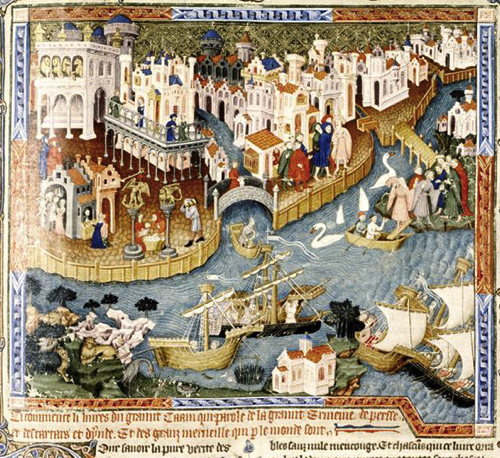Marco Polo's famous
Description of the World was written around 1298. It was Polo's account of the many years he had spent in China.
According to the book's prologue, Marco Polo first travelled to China in 1271 with his father and uncle who were both merchants. While in China, he met the great ruler, Qubilai Khan, and so impressed him that the Khan made Marco his special emissary, sending him on missions throughout the various far-flung provinces of China. Marco Polo finally returned to Venice with his family in 1295. He wrote the account of his travels in 1298 while imprisoned in Genoa (or rather, he described his travels to a French writer named Rustichello who wrote the actual book for him).
Marco Polo's book became enormously influential and served in Europe as one of the primary sources of information about the Orient for many centuries. Christopher Columbus, for instance, took the book with him on his fateful voyage to the Americas. It also inspired a number of legends, such as the idea that Marco Polo brought the secrets of spaghetti and ice cream with him back from China (he didn't).
Some scholars now suspect, however, that Marco Polo never went to China. The argument for this case has been laid out by Frances Wood in her book
Did Marco Polo Go to China?

Illustration from a 15th century manuscript (
Li Livres du Graunt Caam) showing the waterfront of Venice. In the foreground are two travelers, Marco Polo's father and uncle, embarking for the orient.
The basic argument against Marco Polo involves a set of telling omissions. First of all, no reference has ever been found in Chinese archives to an Italian visitor like Marco Polo, despite the fact that China's bureaucrats kept numerous forms of documentation and recorded the presence of many other westerners. If Marco Polo really did serve as a special emissary to the Great Khan, it seems unusual that his presence would never have been noted.
Second of all, Polo's account omits many details about Chinese culture that seemed very important to almost all later European travellers. For instance, Wood notes Polo's "apparent failure to pick up even a few Chinese or Mongol place-names in his seventeen-year stay in China." Nor does he ever mention the Chinese style of writing, despite the dramatic difference between Chinese script and the Roman alphabet.
Marco Polo does not mention seeing woodblock printing, which was then unknown in Europe. He never mentions the Chinese custom of drinking tea (also unknown in Europe at that time), despite the fact that he discusses varieties of Chinese wine. He never mentions the practice of foot-binding, even though this custom fascinated all other Europeans who travelled to China. He never mentions the use of chopsticks; and finally, he fails to mention the Great Wall of China.
Marco Polo did, however, identify some important features of Chinese society. For instance, he described porcelain, the use of coal, and the use of paper money—all unknown to Europeans in the thirteenth century. Nevertheless, it is still hard to imagine that someone could actually go to China and manage to miss all the details that he missed.
Wood suggests that Marco Polo probably never travelled further than his family's trading posts on the Black Sea, but that he had access to Persian or Arabic guidebooks to China from which he was able to piece together his account of China. He probably wrote his account in response to a growing demand for geographies during the late thirteenth century.
Links and References


Comments
One example of the ridiculous nature of the claims made about those things that Marco does not mention is the Great Wall. Why would the Mongols, who ruled the earth to a long way on either side of where the Great Wall stands, have needed a Wall? In reality, the Great Wall as seen today, and as everyone imagines it to be, had not even been built when Marco was in China. It was constructed during the Ming dynasty, after the Mongols had withdrawn from China, when Marco Polo was long dead. There had been earlier 'Great Walls', but none had been built (or even repaired) for several centuries before Marco was in China, and there would have been little to see in his day.
What Marco does mention, however, argues strongly for first-hand knowledge. There is far too much to list here, but it may briefly be noted that he talks about Japan, which no one in Europe had even heard of before, and correctly describes the Grand Canal. The northern sections of the Canal were only constructed while Marco was actually in China, and were finished just before he left. How he could have obtained such up-to-date and accurate information without actually being on the spot is very hard to imagine.
It is time to stop speculating about Marco Polo and his travels. He went to China, and there can be no doubt of this fact.